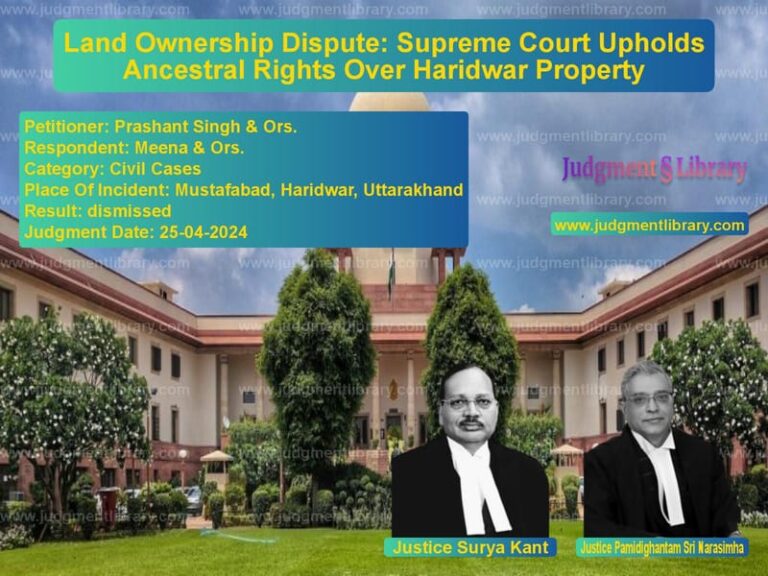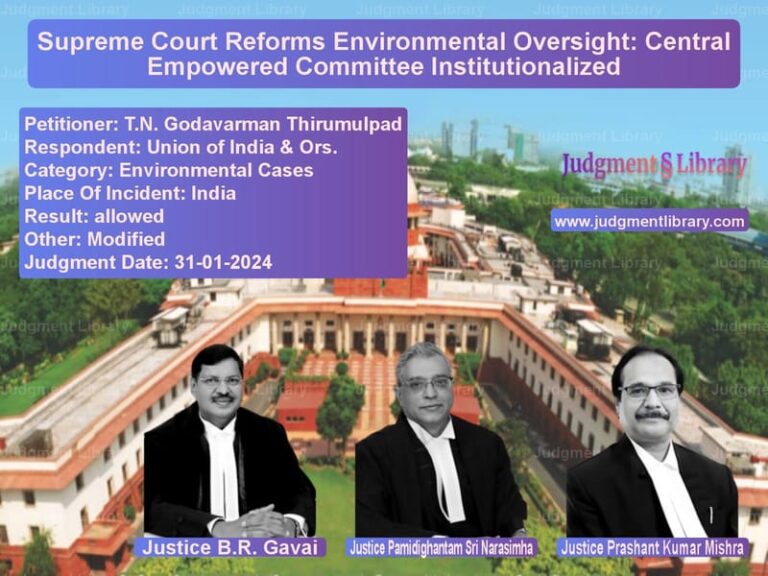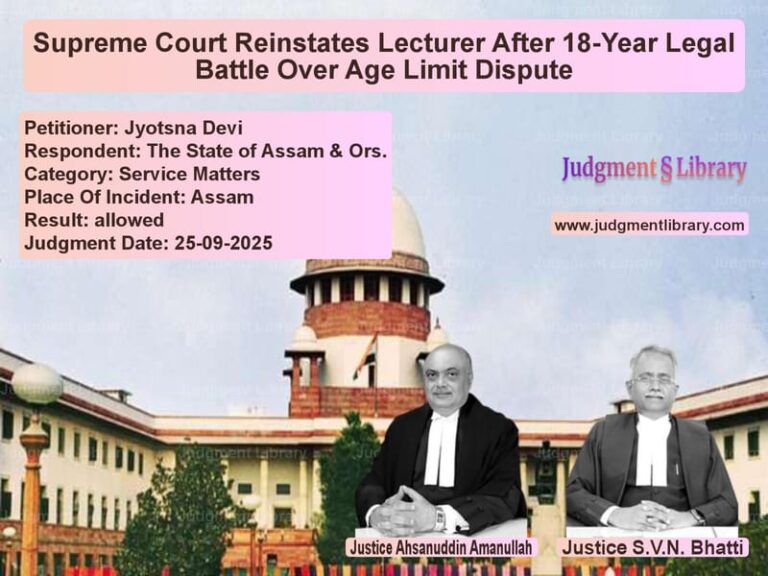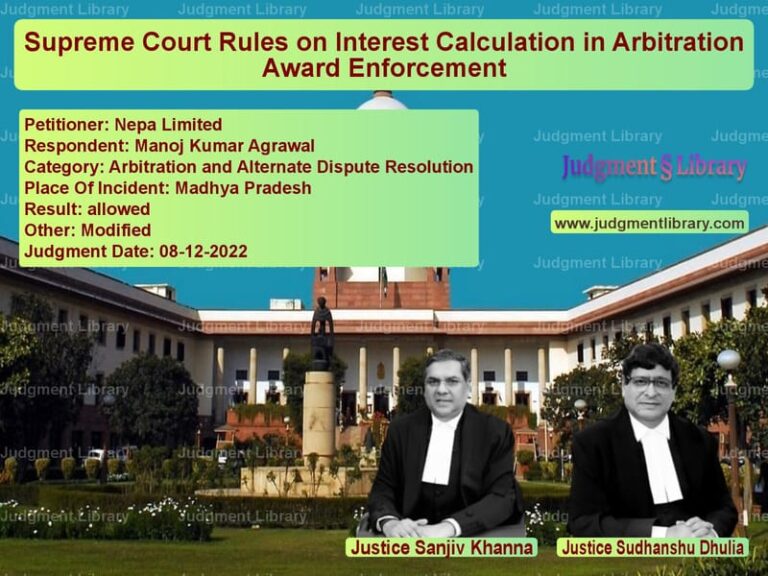Multiple FIRs in Cooperative Society Fraud Case: Supreme Court Orders Investigation
The Supreme Court of India recently ruled on a significant case concerning multiple First Information Reports (FIRs) filed against members of different cooperative housing societies in Gujarat. The case involved allegations of financial mismanagement, fraud, and siphoning of funds by the office bearers and members of these societies. The judgment addressed whether multiple FIRs filed in relation to similar allegations should be quashed or allowed to proceed independently.
Background of the Case
The case involved allegations of financial fraud and mismanagement in five cooperative housing societies in Gujarat. Multiple FIRs were registered against the accused under Sections 406, 409, 420, 465, 467, 468, 471, 120-B, and 477-A of the Indian Penal Code, 1908. The accused, who were office bearers and members of these societies, were alleged to have engaged in fraudulent transactions, falsified accounts, and misappropriated society funds.
Filing of FIRs and Legal Challenge
A total of six FIRs were registered in different police stations in Gujarat. The accused argued that the first FIR (C.R. 1-5/2012) already covered all the allegations, making the subsequent FIRs repetitive and unnecessary. They contended that the registration of multiple FIRs amounted to double jeopardy and sought quashing of the subsequent FIRs under Section 482 of the Code of Criminal Procedure.
The Gujarat High Court accepted this argument and quashed five out of the six FIRs, ruling that the first FIR was sufficient to address all allegations.
Supreme Court’s Observations
The Supreme Court examined the issue in detail and found that each FIR pertained to a different cooperative society with distinct members, transactions, and financial mismanagement allegations. The Court noted:
“All the five Co-Operative Societies against whom the afore-mentioned FIRs were registered are different, their members are different, their area of operation is different, the lands which were sold/transferred are also situated in different areas, the lands were also sold/transferred to different parties on different dates for different sums, the accounting books are different, the persons involved in the falsification of the accounts of every Society are different.”
The Supreme Court held that while there may be some overlap in the allegations, the nature of the fraud and the individuals involved in each case were distinct. The Court ruled:
“It is not possible to hold that all the FIRs are overlapping on one another and that the first FIR alone will be sufficient to take care of the remaining five FIRs.”
Quashing of FIRs and Powers of High Courts
The Supreme Court also addressed the broader issue of quashing FIRs under Section 482 of the CrPC. The Court reiterated that FIRs should not be quashed merely because they involve similar allegations. It stated:
“The High Court, in exercise of its powers under Section 482 of the Code, cannot undertake a detailed examination of the facts contained in the FIRs by acting as an Appellate Court and draw its own conclusion. It is more so when investigation in other Societies is not yet complete.”
The Court further relied on the precedent set in State of West Bengal & Ors. vs. Swapan Kumar Guha & Ors. (AIR 1982 SC 949), where it was held:
“Whether an offence has been disclosed or not must necessarily depend on the facts and circumstances of each particular case. If on a consideration of the relevant materials, the Court is satisfied that an offence is disclosed, the Court will normally not interfere with the investigation into the offence.”
Supreme Court’s Final Judgment
After reviewing the matter, the Supreme Court set aside the Gujarat High Court’s decision and allowed all six FIRs to proceed. The Court directed that:
- Investigations in each FIR should be completed independently.
- Separate charge sheets should be filed for each case.
- Once investigations are complete, the cases may be clubbed together and heard by a single competent court.
The Court stated:
“When all the six cases are filed in the concerned Courts, they would be clubbed together and tried by one competent Court in accordance with law.”
Conclusion
The ruling reinforces the principle that multiple FIRs cannot be quashed merely because they involve similar allegations. The judgment ensures that financial mismanagement in cooperative societies is thoroughly investigated, holding those responsible accountable under the law.
Don’t miss out on the full details! Download the complete judgment in PDF format below and gain valuable insights instantly!
Download Judgment: Chirag M. Pathak & O vs Dollyben Kantilal & Supreme Court of India Judgment Dated 15-11-2017.pdf
Direct Downlaod Judgment: Direct downlaod this Judgment
See all petitions in Fraud and Forgery
See all petitions in Money Laundering Cases
See all petitions in Attempt to Murder Cases
See all petitions in Judgment by R K Agrawal
See all petitions in Judgment by Abhay Manohar Sapre
See all petitions in allowed
See all petitions in supreme court of India judgments November 2017
See all petitions in 2017 judgments
See all posts in Criminal Cases Category
See all allowed petitions in Criminal Cases Category
See all Dismissed petitions in Criminal Cases Category
See all partially allowed petitions in Criminal Cases Category







